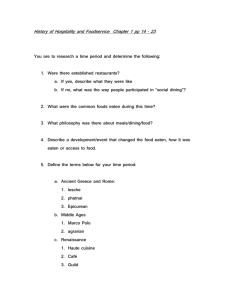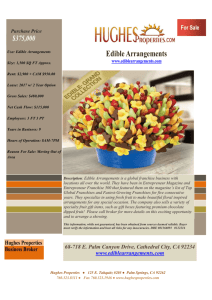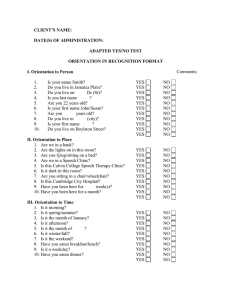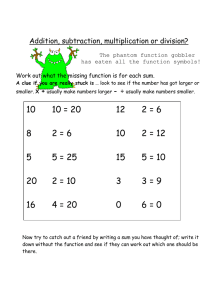A guide to some edible/useful (mostly) local species
advertisement
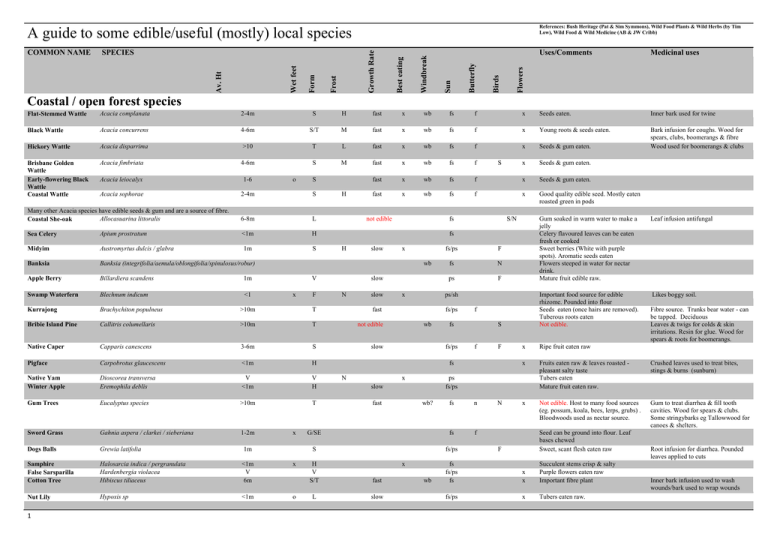
Uses/Comments Medicinal uses S H fast x wb fs f x Seeds eaten. Inner bark used for twine Black Wattle Acacia concurrens 4-6m S/T M fast x wb fs f x Young roots & seeds eaten. Hickory Wattle Acacia disparrima >10 T L fast x wb fs f x Seeds & gum eaten. Bark infusion for coughs. Wood for spears, clubs, boomerangs & fibre Wood used for boomerangs & clubs Brisbane Golden Wattle Early-flowering Black Wattle Coastal Wattle Acacia fimbriata 4-6m S M fast x wb fs f x Seeds & gum eaten. Acacia leiocalyx 1-6 fast x wb fs f x Seeds & gum eaten. Acacia sophorae 2-4m S fast x wb fs f x Good quality edible seed. Mostly eaten roasted green in pods 6-8m L Birds Av. Ht Flowers Butterfly 2-4m Frost Acacia complanata Form Flat-Stemmed Wattle Wet feet Sun Growth Rate SPECIES Windbreak COMMON NAME Best eating A guide to some edible/useful (mostly) local species References: Bush Heritage (Pat & Sim Symmons), Wild Food Plants & Wild Herbs (by Tim Low), Wild Food & Wild Medicine (AB & JW Cribb) Coastal / open forest species Many other Acacia species have edible seeds & gum and are a source of fibre. Allocasuarina littoralis Coastal She-oak o S H not edible Sea Celery Apium prostratum <1m H Midyim Austromyrtus dulcis / glabra 1m S Banksia Banksia (integrifolia/aemula/oblongifolia/spinulosus/robur) Apple Berry Billardiera scandens 1m Swamp Waterfern Blechnum indicum <1 Kurrajong Brachychiton populneus >10m T fast Bribie Island Pine Callitris columellaris >10m T not edible Native Caper Capparis canescens 3-6m S slow Pigface Carpobrotus glaucescens <1m H Native Yam Winter Apple Dioscorea transversa Eremophila deblis V <1m V H Gum Trees Eucalyptus species >10m T Sword Grass Gahnia aspera / clarkei / sieberiana 1-2m Dogs Balls Grewia latifolia 1m Samphire False Sarsparilla Cotton Tree Halosarcia indica / pergranulata Hardenbergia violacea Hibiscus tiliaceus <1m V 6m x Nut Lily Hypoxis sp <1m o 1 fs H V x F S/N fs/ps F fs N ps F Gum soaked in warm water to make a jelly Celery flavoured leaves can be eaten fresh or cooked Sweet berries (White with purple spots). Aromatic seeds eaten Flowers steeped in water for nectar drink. Mature fruit edible raw. S Important food source for edible rhizome. Pounded into flour Seeds eaten (once hairs are removed). Tuberous roots eaten Not edible. fs slow x wb x S slow N slow x ps/sh fs/ps wb f fs fs/ps f F fs N x fast fs n G/SE fs f S fs/ps H V S/T fast L slow wb? x wb N Likes boggy soil. Fibre source. Trunks bear water - can be tapped. Deciduous Leaves & twigs for colds & skin irritations. Resin for glue. Wood for spears & roots for boomerangs. x Ripe fruit eaten raw x Fruits eaten raw & leaves roasted pleasant salty taste Tubers eaten Mature fruit eaten raw. Crushed leaves used to treat bites, stings & burns (sunburn) x Not edible. Host to many food sources (eg. possum, koala, bees, lerps, grubs) . Bloodwoods used as nectar source. Gum to treat diarrhea & fill tooth cavities. Wood for spears & clubs. Some stringybarks eg Tallowwood for canoes & shelters. ps fs/ps slow Leaf infusion antifungal Seed can be ground into flour. Leaf bases chewed Sweet, scant flesh eaten raw F fs fs/ps fs x x Succulent stems crisp & salty Purple flowers eaten raw Important fibre plant fs/ps x Tubers eaten raw. Root infusion for diarrhea. Pounded leaves applied to cuts Inner bark infusion used to wash wounds/bark used to wrap wounds Medicinal uses Flowers Birds Butterfly Uses/Comments Sun Windbreak Best eating Growth Rate Frost Form Wet feet SPECIES Av. Ht COMMON NAME Coastal / open forest species continued Goats Foot Ipomea pes-caprae <1m V Dogwood Heaths Cabbage Palm Swamp Box Paperbark Jacksonia scoparia Leucopogon sp Livistona australis/decora Lophostemon suaveolens Melaleuca quinquinervia 2-3m 1-3m >10m >10m >10m S S P T T Bottlebrushes Melaleuca species come in many shapes and forms. Flowers are a good source of nectar flowers can be sucked or soaked in water in a picci (container from base of Piccabeen Palm frond), and drunk fresh or fermented into alcohol. Melastoma affine 2m x Mentha diemenica / saturioides S/T Pandanus tectorius 4-6m S/T fs\ps fs fs/ps fs Blue tongue Native mint / pennyroyal Screw Pine x x x fs S H fast slow wb H H fast fast not edible wb N fast Tuber / taproot eaten roasted after removing outer layers. fs/ps fs ps x F f fs fs/ps fs/ps f N N x F x Flag Iris's Geebung Shrubby Pine Patersonia sericea / fragilis / glabrata Persoonia stradbrokensis / virgata Podocarpus spinulosus 2m L S S Pigweeds Bracken Fern Portulaca australis / oleracea Pteridium esculentum 1m H F Scaevola Warrigal Greens Scaevola calendulacea Tetragonia tetragonioides <1m <1m H H Fringed Lily Thysanotus tuberosus <1m L slow fs/ps x Native Bluebells Grass Trees Wahlenbergia sp Xanthorrhoea johnsonii / fulva / latifolia <1m 2-4m fs/ps fs x G/SE slow slow King Fern Angiopteris evecta 2-3m x F Swamp Waterfern Blechnum indicum <1 x F N Rainforest Spinach Creek Mat Rush Long Mat Rush Warrigal Greens Elatostema reticulatum Lomandra hystrix Lomandra longifolia Tetragonia tetragonioides <1m 1m 1.2m <1m x x H G/SE G/SE H H H x wb x F fs/ps fs/ps H fs fs x H f x N Leaves heated & applied to wounds/stings/bites or for muscular pain (heat pack) Trunk cut & gum exudation eaten at certain times of the moon Small fruits eaten Palm heart eaten. Palm killed in process Not edible Bark used for canoes & shelters Nectar source. Bark used for Leaves were chewed & crushed & huts/raincoat/tinder/bedding/cooking sniffed for colds. etc (nature’s esky) Mature fruit eaten raw. Leaves aromatic Fruit roasted to extract edible seeds. Fruit eaten cooked in small quantities Rhizome eaten Edible fruits - like sweet cotton wool Mature fruit edible raw. May have medicinal properties Fibre for baskets Hard plant to germinate. Leaves eaten raw. Roots cooked & seeds ground & roasted into cakes. Young shoots eaten. Rhizomes pounded Juice from young fronds used to & roasted into cakes relieve bites & stings Mature black fruit eaten raw. Leaves edible when cooked (popular European vegetable).Annual. Tubers eaten (raw or pounded and roasted) Blue flowers eaten raw Edible nectar, seeds & leaf bases. Grubs Source of resin/flower spikes used in in trunk base firemaking. Resin heated & used as glue (a traded item) Waters edge ps slow x ps/sh wb wb x ps/sh fs/ps fs/ps fs f f Frond stems up to 6m long are filled with edible starch. Probably best cooked into cakes Important food source for edible rhizome. Likes boggy soil. Leaves eaten. Best when cooked. Edible leaf stalk bases. Good edge plant Edible leaf stalk bases. Good edge plant Leaves edible when cooked (popular European vegetable).Annual. Very rare in the wild in SEQ harvest from cultivated specimens only Edible corms eaten raw or pounded & baked Delicious edible tubers. Best in about 200mm of water. Edible tubers, seeds, flowers & stalks Applied for burns or lesions poultice? Leaves used for dillies & bandages Leaves used for dillies & bandages In the water Clubrush Bolboshoenus fluvialatis 1m x G/SE Water Chestnut Eleocharis dulcis 1m x G/SE Water Lillies Nympheaea species - x 2 fs/ps x fs fs/ps H x T H fast wb not edible Medicinal uses Flowers o fs/ps fs fast Birds G/SE Butterfly x x Uses/Comments Sun Windbreak Best eating Growth Rate 1m 2m Frost Form Triglochin procera Typha orientalis / domingensis Wet feet Water Ribbons Bulrush SPECIES Av. Ht COMMON NAME Tuber eaten raw or roasted Underground stems contain gluten for flour (roasted). Flowers spikes eaten raw or cooked. New shoots eaten raw H Rainforest margins Blackwood Acaia melanoxylon >10m Soap Tree / Red Ash Alphitonia excelsa >10m T L fast Cinnamon Myrtle Backhousia myrtifolia 3-5m S L slow Little Kurrajong Coast Canthium Flax Lilies Brachychiton bidwillii Cyclophyllum coprosmoides Dianella sp 3-6m 5-10m <1m S S/T L Koda Ehretia acuminata >10 Little Bolwarra Eupomatia bennettii Copper Laurel Eupomatia laurina Creek Sandpaper Fig Ficus coronata Native Rosella Hibiscus heterophyllus 3-6m Creek Mat Rush Long Mat Rush Macaranga Lomandra hystrix Lomandra longifolia Macaranga tanarius 1m 1.2m 5-8m Muttonwood Hairy Panic Grass Native Mulberry Smooth Psychotria Hairy Psychotria Native Raspberries Native Stinging Nettle Ivy Leaf Violet Sandfly / Mozzie Plant Myrsine variablis Panicum effusum Pipturis argenteus Psychotria daphnoides Psychotria loniceroides Rubus rosifolius/moluccanus/moorei/parviflorus Urtica incisa Viola hederacea / banksii / betonicifolia Zieria smithii / minutiflora 3-6m 1m 3-4m 1-2m 1-2m S/T 1m M 0.5 - 1.5m H H S N-recovers F x f S x x fs/ps fs/ps ps x L fast slow slow T L fast fs/ps <1 S N slow 2-4m S N S/T L fast x S L fast x G/SE G/SE S/T H H o x x L S S S N N F F? f F* x ps F x x ps F x wb fs/ps f fs/ps wb wb fast G/SE wb f fs/ps 6m x fs/ps fs/ps fs/ps N x f f not edible F slow fast fast slow slow x stings F* wb fs/ps ps fs/ps ps ps fs/ps ps ps/sh f F S F F F FH f x not edible Gum eaten. Seeds eaten ground - highly nutritious. Not edible. Used for soap. Leaves rubbed in water to stun fish. Aromatic leaves . Good Bay Leaf substitute Seeds eaten (after hairs are removed) Mature fruit eaten raw. Caution - Mature blue / purple fruit eaten raw, but only in small quantities (can cause dizziness). Roots pounded & roasted Mature dark yellow fruit eaten raw.. Small and very sweet Mature fruit eaten raw. - best to spit out spicy seeds Mature fruit eaten raw. - best to spit out spicy seeds Edible fruits. Sweet juicy figs best eaten squeezed out of skin or cooked in preserves Young shoots, roots, leaves & flowers eaten (leaves need to be cooked) Leaf bases eaten & nectar from flowers. Leaf bases eaten & nectar from flowers. Not edible. Twigs & bark used as a fish poison? Leaf tips chewed for upset stomach. Linament of leaves & twigs muscular pains - gargled for toothache Wood used for axehandles. Leaves used as sandpaper. Fibre source for twine, nets Important fibre plant. Leaves used to make dillies Leaves used to make dillies Used for light spears (eg for fish) & fibre Small, sweet, blue fruits occur along stems. No records on edibility Seeds collected & ground into flour Small white fruit eaten(quaity varies) Mature fruit eaten raw. Mature fruit eaten raw. Delicious edible fruits Caution stings! Edible flowers eaten raw Not edible. Leaves rubbed on skin to deter insects. Rainforest species Bushy edge plants under 2m Ginger Alpinia arundelliana 1m H Native Ginger Alpinia caerulea 2m H N-recovers Cunjevoi Alocasia bribanensis 1.5m x H N-recovers Creek Mat Rush Lomandra hystrix 1.2m x G/SE 3 H slow x ps/sh F x ps/sh F ps/sh F toxic wb fs/ps f Edible rhizomes, stems, leaves & fruit. Leaves tenderise meat Edible rhizomes, stems, leaves & fruit. Leaves tenderise meat Toxic. Roots were leached of toxins for weeks before use. Edible leaf stalk bases. Good edge plant Leaves / stems heated, crushed and applied to sores & stings. Leaves used for dillies & bandages ps F Mature yellowish fruit eaten raw. slow ps F Mature yellowish fruit eaten raw. fast fs/ps F Mature yellow fruit eaten raw wb wb fs/ps ps F F 2m S L sow Smooth Psychotria 1-2m S N slow Hairy Psychotria Psychotria loniceroides 1-2m S N Native Elderberry Sambuccus australasica 1-1.5m S Medicinal uses Flowers Birds Mature orange fruit eaten. Pittosporum multiflorum (syn Citriobatus pauciflorus) Psychotria daphnoides Sun F Frost Butterfly Windbreak Best eating Growth Rate Uses/Comments f Form Wet feet SPECIES Av. Ht COMMON NAME Rainforest species continued Orange Boxthorn wb fs/ps Bushy Shrubs Rose Myrtle Native Current Archirhodomyrtus beckleri Carrissa ovata 2-4m 2-4m S S/V M Finger Lime Citrus australasica (Microcitrus) 2-4m S/T Native Lime Citrus australis (Microcitrus) 3-6m S/T Gympie Stinger Dendrocnide moroides 2-4m S Eugenia reinwardtiana Scrub Ironwood Beach Cherry / Cedar Bay Cherry Gossia acmenoides 2-4m 3-6m S S Python Tree Gossia bidwillii 3-6m S Scaly Myrtle Gossia hillii 3-6m S Thread-Barked Myrtle Gossia inophloia 2-4m S Narrow-leaf Lilly Pilly Syzygium smithii (small form) 3-5m S L White Lilly Pilly Hairy Acronychia Silver Aspen Beach Acronychia Beach Bird's Eye Wild Quince Hairy Alectryon Native Elm, Axe Handle Wood Lemon Scented Myrtle Acronychia oblongifolia Acronychia pubescens Acronychia wilcoxiana Acronychia imperforata Alectryon coriaceus Alectryon subcinereus / connatus / unilobatus Alectryon tomentosa Aphananthe philippinensis 6-10m 4-6m 6-10m 4-6m 4-6m L 8-12m 8-12m S/T S/T S/T S/T S S/T T T Backhousia citriodora 4-8m Native Caper/Pomegranate Native Wampi Hervey Bay Wampi Silky Mytle Native Ebony Yellow Tulip Blueberry Ash Capparis arborea / velutina 2-4m Clausena brevistyla 3-6m Clausena smyrelliana 3-6m Decaspermum humile 4-8m Diospyros australis, elipticifolius, geminata, pentamera Drypetes depanchei 8-12m Elaeocarpus reticulatis 3-6m S/T S/T S/T Creek Sandpaper Fig Ficus coronata slow L slow x wb fs/ps f H slow x wb fs/ps f H fs/ps f F fast L slow slow x slow slow wb wb fs/ps fs/ps F F wb fs/ps F wb fs/ps F wb fs/ps F wb fs/ps F fs/ps ps fs/ps fs/ps fs/ps fs/ps fs/ps ps F* F F x x Sweet orange edible fruits. Mature -+-black fruit edible raw. Prickly - not too close to paths. Edible fruits Prickly - not too close to paths. Edible fruits Caution stinging leaves. Fruits eaten but may have stinging hairs. Mature red fruit eaten raw Suitable as an edge plant or windbreak. Edible fruits. Suitable as an edge plant or windbreak. Edible fruits. Suitable as an edge plant or windbreak. Edible fruits. Suitable as an edge plant or windbreak. Edible fruits. Suitable as an edge plant or windbreak. Edible fruits. Outer bark used for fibre. Leaves applied for rheumatism - Ouch!! Small trees 4 4-6m x x x N L slow x S/T L slow x S N slow wb x L slow wb T S/T L slow wb S/T L x f f f F F F F fs/ps x ps/sh f fs/ps fs/ps fs/ps fs/ps fs/ps fs/ps f f fs/ps f f x F F F F F F F x x Mature white fruit eaten (aromatic) Mature white fruit eaten (aromatic) Mature white fruit eaten (aromatic) Yellow fruit eaten (aromatic) Fruit eaten (Astringent) Fruit eaten (Astringent) Fruit eaten (Astringent) Small fruit taste very sweet when ripe No records found on edibility (soft and yellow / brown) Leaves are aromatic & have a variety of culinary uses. Edible fruit & flower buds (pickled capers). Prickly Mature fruit edible raw. No records found on edibility Mature fruit edible raw. No records found on edibility Very ripe, black fruit sweet raw No records found on edibility Mature fruit eaten raw. Best ripened after picking to reduce astringency Mature fruit eaten raw Scant sweet flesh eaten from seed Kernels used as decoration when well ripened. Sweet edible fruit - one of the best Important fibre eating local figs. Best squeezed from skin when eaten Medicinal uses Flowers Birds Butterfly Uses/Comments Sun Windbreak Best eating Growth Rate Frost Form Wet feet SPECIES Av. Ht COMMON NAME Small trees continued Wild quince Guioa semiglauca Black Apple / Coondoo Pouteria austrais / eerwah / & other species Native Guava Whalebone Tree Brush Cherry / Lilly Pilly Blue Lilly Pilly Rhodomyrtus psidioides Streblus brunonianus Syzygium australe / smithii Syzygium oleosum 8-15m T wb T x 6-10m 6-10m 5-10m S/T S/T S/T H x x x 6-12m T N fs/ps F F F F x Very small, sour fruits eaten raw when capsules split. Flesh yellow/orange Fruit eaten raw after ripening underground for a few days Fruit eaten raw when soft Sweet small fruits eaten raw Mature fruit eaten raw fs/ps F fs/ps F x Aromatic edible fruits ps/sh F wb wb fs/ps fs/ps fs/ps wb f Small trees - upright and not spreading Picabeen Palm Archontophoenix cunninghamiana >10m x P Tree Ferns Cyathea cooperi 5-10m x F Davidson Plum Davidsonia pruriens / jerseyana / johnsonii Red Bopple Nut Hicksbeachia pinnatifolia 6-10m Candle Nut Aleurites moluccana Bunya Pine S/T not edible ps/sh L med x fs/ps S/T slow x fs/ps >10m T fast x fs/ps Araucaria bidwillii >10m T Atherton Almond Athertonia diversifolia >10m T Aniseed Myrtle >10m T Black Bean Syzygium anisata (syn Backhousia / Anetholea) Castanospermum australe >10m T Flame Tree / Lacebark Brachychiton acerifolius / discolor T fast Stinging Trees Dendrocnide excelsa, photinophylla T fast Native Tamarind Diploglottis cunninghamii >10m T N slow x Small Leaved Tamarind Blue Quandong / Hard Quandong Bats-wing Coral Tree Diploglottis campbellii >10m T N slow x T L fast Erythrina wespertilio >10m T L Native Figs Silky Oak / White Yiel Yiel Macadamia, Bush Nut Ficus sp Grevillea robusta / hilliana >10m >10m T T L Macadamia integrifolia/tetraphylla 8-12m T M Corduroy Tamarind Brown Pine Native Crabapple Peanut Tree Mischarytera lautereriana Podocarpus elatus Schizomeria ovata Sterculia quadrifida >10m >10m >10m 6-10m T T T T N M L Red Apple Syzygium ingens >10m T L N? Fruit not edible. Palm heart eaten killing tree Caution - Fern heart eaten after leaching tannins. New shoot eaten. Sour edible fruit with many culinary uses. Deciduous. Leaf sheath used as a container (picci) Identity symbol of Blackhall Range clans Nuts best eaten cooked. Roasted best. High oil content - used as a candle when skewered Important cultural values - Bunya Festivals. Grubs - dead trees Large trees 5 Elaeocarpus grandis / obovatus o H x wb x slow L H fs/ps x slow fs/ps wb toxic fs/ps x fs/ps stings toxic S fs/ps f F Caution stinging leaves fruits eaten but may have stinging hairs. Chewed inner bark used to absorb honey fs/ps F fs/ps F Mature fruit edible raw (sour) or great for jams / sauces Not local. Mature fruit edible raw (sour) or great for jams / sauces fs/ps F x Large upright tree with buttresses. Edible fruit, best prepared/cooked fs/ps N x Seeds toxic. Roots eaten raw. F N x All figs edible. Quality varies. Rich source of nectar B? x x fs f slow x x fast x fs/ps fs/ps fs/ps fs/ps wb x Toxic. Needs treatment before eating. Flour used in cakes. Edible seeds (once hairs are removed) f f wb x fs/ps fs/ps fs/ps fast N Immature nuts best raw. Mature ones cracked & roasted or pound into flour for cakes Not local. Blue shelled nuts with flavour of Almonds Nth NSW local. Aromatic leaves. fs/ps f F F F S F Fibre source. Trunks bear water - can be tapped Inner bark pounded to line babies beds. Outer bark used for fibre. Leaves applied for rheumatism Ouch!! Outer bark used for canoes & shields. Flowers and seeds for decoration. Inner bark for headache & sore eyes Grafted tree will be smaller and fruit much quicker. Fruit eaten Edible fruit. bushy, hardy tree. Male & female flowers on separate trees. Ripe white fruits eaten Edible tasty nuts. Best dried or roasted Bark used for fibre. Leaves heated & before shelling applied to wounds to stop bleeding Mature fruit edible raw (sour) or great for jams / sauces Butterfly Windbreak 10m T N x wb fs/ps F x 10-20m T N x wb fs/ps F x 1m 2m 2m 3-4m H H P P N-recovers N-recovers slow x x F F F N slow ps/sh ps/sh ps/sh sh V V N x ps F 2m 2-4m <1 <1 S S H H fast slow slow slow ps ps/sh ps/sh ps/sh F H H M N slow slow ps ps slow Sun Flowers Syzygium luehmannii Best eating Birds Cherry Satinash Growth Rate Frost Syzygium corynanthum Uses/Comments Form Sour Cherry Wet feet SPECIES Av. Ht COMMON NAME Medicinal uses Mature fruit edible raw (sour) or great for jams / sauces Mature fruit edible raw (sour) or great for jams / sauces Plants requiring some shade Ginger Native Ginger Broad-leaf Palm Lily Walking Stick Palm Alpinia arundelliana Alpinia caerulea Cordyline petiolaris Linospadix monostachys Giant Pepper Vine Piper hederaceum (syn novaehollandiae) Sambucus australasica Tasmannia insipida Viola betonicifolia Viola hederacea Native Elderberry Brush Pepperbush Native Violet Ivy Leaf Violet f x Rhizomes, stems, leaves & fruit eaten. Edible rhizomes, stems, leaves & fruit. Mature fruit eaten Young shoots edible Edible fruits and new shoots (kills palm) Native pepper vine. Real peppercorns Leaves tenderise meat Leaves tenderise meat x x Fruits eaten raw Seeds used as pepper Flowers eaten Flowers eaten. Excellent spreading groundcover Vines Climbing Caper Lawyer Cane Capparis sarmentosa Calamus muelleri V V V V Dodder Laurel Slender Grape Kangaroo Vine, Native Grape Water Vine Cassytha sp Cayratia clematida Cissus antarctica V V V V V V N fs/ps ps fs/ps Cissus hypoglauca V V M fs/ps Headache Vine Clematis glycinoides V V Native Yam Millaa Millaa Vine Supplejack Dioscorea transversa Eleagnus triflora Flagellaria indica V V V V V V Climbing Pandanus Scrambling Lily Cockspur Thorn Freycinetia scandens / excelsa Geitonoplesium cymosum Maclura cochinchinensis V V S/V V V S/V Bellbird Vine Melodinus australis V V Zig Zag Vine Native Passionfruit Giant Pepper Vine Melodorum leichhardtii Passiflora herbertiana Piper hederaceum (syn novaehollandiae) Pothos longipes Smilax australis / glycophylla V V V V V V V V V V Tetrastigma nitens V V Trophis scandens (syn Malaisia) V V Not edible N x H f F F x ps ps fs/ps fs/ps f F F Excellent fruit, but rare fruiting. Edible flower buds (pickled) Canes/leaves used for baskets & Young shoots chewed & swallowed shelters. Scant edible fruits. Barbs used for dysentery. as fish hooks. Small mature fruit eaten raw. Stems used as a fibre source. Mature fruit edible. Tuber cooked & eaten Mature fruit eaten Larger vines yield fresh water when cut. Mature fruit eaten Cut large vines yield fresh water. Fruit Jelly soothed throat Not edible Crushed leaves sniffed for headache relief - best for sinus Delicious edible tubers - raw, steamed or roasted. Mature fruit eaten raw. Source of fibre Mature fruit eaten. Sweet musk flavour, Important for tree climbing. Fibre source for twine, fish traps & nets. Sap applied to but gritty texture. sore eyes Candlestick Vine Barb Wire Vine / Native Sarsparilla Shining Grape Burny vine slow slow L slow x N slow L ps/sh ps fs/ps F F F fs/ps F fs/ps fs/ps ps f f x ps/sh fs/ps F F Mature red fruit eaten raw. Ripe black fruits eaten raw. fs/ps F Mature black fruit eaten raw (best native grape) Mature red fruit eaten raw. fs/ps f Small mature fruit eaten raw. Stems used for fibre Mistletoes have sweet edible fruit (many species occur in SEQ) . Orchids (including many ground orchids) have edible bulbs or pseudobulbs. These contain starches eaten raw or pounded into flour & cooked. Cymbidium eaten raw. 6 F F Attractive scrambling vine. Fruit eaten Young shoots eaten - taste like peas Mature orange fruit sweet & edible. Thorns used to remove splinters Watch out for grubs! Mature red fruits edible - watch out for the white sticky latex Orange fruit eaten - sour but rich in flavour. Can be grown as shrub with pruning Sweet pulp eaten - (quality seems to vary greatly) Native pepper vine. Sweet flesh. Seeds are peppercorns F Starchy bulbs treatment for diarrhea Older stems used for firesticks Stems yield water Excellent source of fibre for twine, nets, dillies, etc
